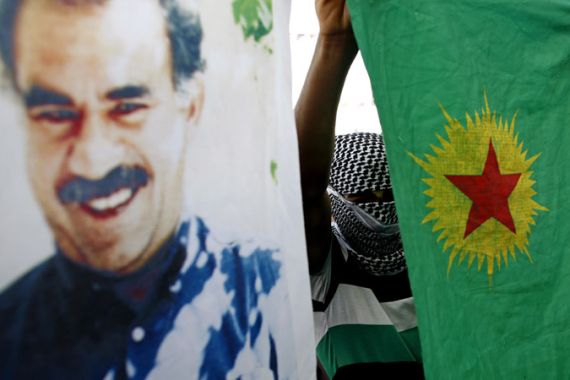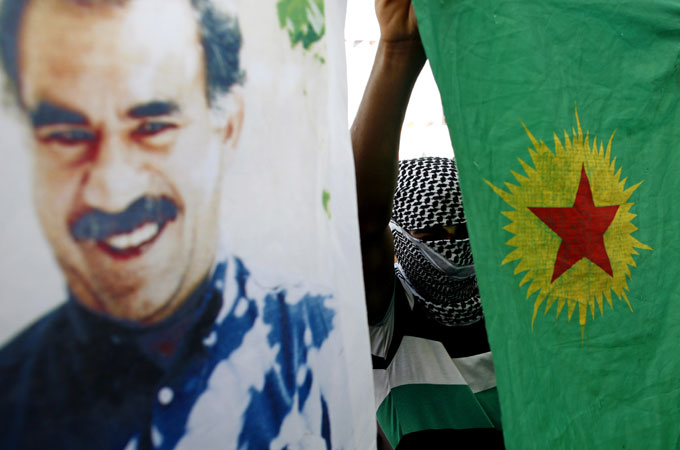Erdogan: Kurdish leader should have hung
Turkish PM says his party would have executed separatist Abdullah Ocalan if it had been in power.

 |
| A masked Kurdish demonstrator holds a PKK flag next to a portrait of Abdullah Ocalan, the group’s jailed leader [EPA] |
Turkish Prime Minister Recep Tayyip Erdogan has said that his party would have executed Abdullah Ocalan if it had been in power when the jailed Kurdish separatist leader was captured in 1999, according to Turkish media reports.
Erdogan made the comments after the leader of Turkey’s MHP ultra-nationalist party, Devlet Bahceli, said on Thursday that the ruling Justice and Development Party (AKP) was in negotiations with the country’s main Kurdish party over Ocalan’s release.
Ocalan, the leader of the banned Kurdistan Workers’ Party (PKK), was captured by commandos in Kenya in 1999, transferred to Turkey and sentenced to death.
But the sentence was suspended and then commuted to life imprisonment after Turkey abolished the death penalty in 2002. Since then he has been held in a prison on Imali, an island in the Sea of Marmara, south of Istanbul.
 |
Asked by Turkish radio what he would have done if he had been in power when Ocalan was caught, Erdogan replied: “I would have implemented the necessary punishment.”
Referring to the coalition government of the time, which included Bahceli’s MHP, Erdogan added: “If they hadn’t ignored this then, this would all be over.”
Asked what the AKP would have done if it had been part of a coalition, he said: “Either he would have been executed or we would have resigned.”
Erdogan won significant support in Kurdish regions at the last election in 2007 after pledging to introduce greater rights for Turkey’s 14-million Kurds.
In 2009, he initiated the so-called “Kurdish opening”, launching the first state television channel in Kurdish, improving cultural rights for Kurds and encouraging PKK fighters to lay down their arms.
Nationalist tone
But Erdogan has struck a more nationalist tone during the election campaign, accusing the main pro-Kurdish Peace and Democracy Party (BDP) of having links to the PKK. He has also said that his party will not recognise any languages other than Turkish as official state languages.
The PKK has waged a decades-long insurgency against Turkish rule in the country’s Kurdish majority southeast that has claimed more than 40,000 lives. It has stepped up its campaign in recent months after announcing in March that it was ending a unilateral ceasefire declared last year.
Turkish armed forces regularly clash with PKK fighters both within Turkey and in the mountains of northern Iraq’s autonomous Kurdish region. Last month, a policeman died in an attack, claimed by the PKK, on an AKP election convoy in Turkey’s Black Sea region, shortly after Erdogan had addressed a campaign rally.
The group is recognised as a terrorist organisation by Turkey, the US and the EU.
 |
Ocalan continues to wield influence over the Kurdish campaign for autonomy from his jail cell. Last month, he warned that “all hell would break loose” unless Turkey’s new government opened negotiations within three days of the elections.
“June 15 is the deadline. Either a meaningful negotiation process will begin or a great war will start and all hell will break loose,” Ocalan said via his lawyers, the pro-Kurdish Firat news agency reported.
Analysts warn that Kurdish aspirations for greater autonomy could derail Erdogan’s plans to introduce a new constitution if his party secures an expected third term on Sunday.
“If a new constitution fails to address Kurdish concerns, the PKK might renew its struggle, not only through an armed campaign, as happened in the last two decades, but also through a campaign of civil disobedience,” Behlul Ozkan, an expert on Turkish affairs at Istanbul’s Marmara University, wrote for Al Jazeera.